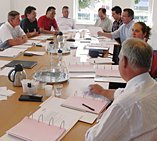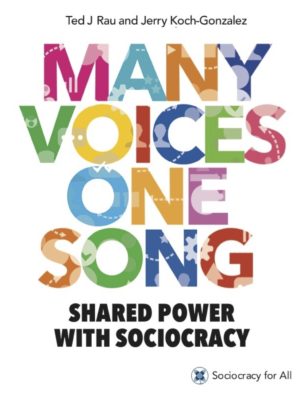The most viewed pages and the most searched topics on Sociocracy.info continue to be those related to policy and operations decisions.
The distinction between policy and operations decisions is not unique to sociocracy, but it is one that many of us don’t understand. Most often we don’t even realize that we are following a policy — it’s just the way things are done.
We also don’t recognize a policy decision as distinct from an operations decision. Thus short-term operations decisions can drift into being applied as long-term policy decisions.
Policy Decisions
What is a policy decision?
A policy decision governs future policy and operations decisions. It places controls or requirements on actions and related decisions. A policy decision is unrelated to the name of the policy. Unless there is a policy requiring a certain format, the format is not defining.
If a decision limits or enables other decisions, it is a policy decision no matter the title: “Policy for Kitchen Hygiene” or “Kitchen Hygiene.” A policy can be one sentence or several pages. Sociocracy is concerned with content, with meaning and function, not labels.
Who makes policy decisions?
One of the beauties of sociocracy is that policy and operations decisions are made at all levels of the organization. They are made by those they directly govern. The President or the top management of a landscaping company probably wouldn’t set policy for organizing plants in the greenhouse. The Greenhouse Circle or team will make that decision.
How do you know a policy is effective?
Policies include a means of measuring the policy’s effectiveness and are reviewed on a regular schedule—or sooner if necessary. Once a policy is implemented, the circle or team responds to feedback and adjusts accordingly.
When operations decisions drift into being applied as policy decisions, their formal consideration and review is most often neglected.
Operations Decisions
 What are operations decisions?
What are operations decisions?
Operations decisions govern day-to-day actions. They are made within the limits or permissions of policy decisions. Operations decisions put policy decisions into action.
Who makes the operations decisions?
The circle or team makes policy decisions that govern operations decisions and who will make them. Since operations decisions are typically made moment-to-moment throughout the day, most commonly the policy decision is that the circle or team leader will make them.
The first principle of sociocracy is consent. How does that apply to autocratic operations decision?
The circle or team can choose any method for making decisions as long as the decision to do so is made by consent. A policy decision that the leader will make day-to-day operations decisions without autocratically would be made by consent.
For directing operations, autocratic decision-making is more efficient than stopping work to make a group decision. The leader can making operations decisions without consultation. This doesn’t mean the operations leader can’t ask for information, advice, or druthers.
Smaller circles or teams of 2-3 people, however, may be effective with a policy to make operations decisions among themselves.
An Example of Policy and Operations Decisions
A Residential Community-Level Decision: The landscape design will have the look of wild flower field, appearing spontaneous and not requiring intensive care.
Landscaping Team-Level Policy: Whenever possible, seeds and cuttings will be used. Purchasing plants will only be done in the case of unique requirements or opportunities.
Operations-Level Decision: Next weekend, we will plant the southern triangle bed. Mary will delegate tasks and schedule workers.Gene will collect all the seedlings that residents started this spring.
- A policy decision governs future decisions and actions.
- An operations decision governs day-to-day decisions and actions.
Policy and Operations Decisions in the United States Government
The United States and many other countries function with three branches of government that have distinctive roles in relation to policy and operations decisions:
The Legislative Branch, the House and Senate, makes policy decisions for the governing of the United States. It writes and approves legislation or laws. It also makes policy decisions that govern its internal operations.
The Executive Branch makes operations decisions, which are governed by the policy decisions made by the Legislative Branch. As a duty of the Executive Branch, the President (as CEO) consents to policies passed by the Legislative Branch. While the President can veto legislation, the Legislative Branch can over turn the veto. The Executive Branch also makes policy decisions that govern its internal operations.
The Judicial Branch determines whether the Legislative Branch and the Executive Branch are functioning within the policy decisions of the United States Government. These policies include the Constitution, other legislation, and the body of law formed by previous decisions. Because laws govern future decisions, they are policy decisions. The Judicial Branch also makes policy decisions that govern its internal operations.
The Judicial Branch functions on the basis of common law in which previous decisions become legal precedents. In effect, the Judicial Branch clarifies the meaning of policy decisions and decides how they should be applied in operations and if they don’t contradict other policy decisions.
Policy Decisions in a Sociocratic Government
There are no authoritative methods for applying the three principles of sociocracy in governing a country. One probable step, however, would be the coming together of representatives of all three branches of government in a coordinating or management circle to collaborate on high level policies. The process would be less contentious because they would view themselves as one body, not three competing organizationsThe Delibrative Democracy Consortium (DDC)u is an alliance o....
Just One More Reminder
- A policy decision governs future decisions and actions.
- An operations decision governs day-to-day decisions and actions.
Categories: Decisions and Power, History and Philosophy


